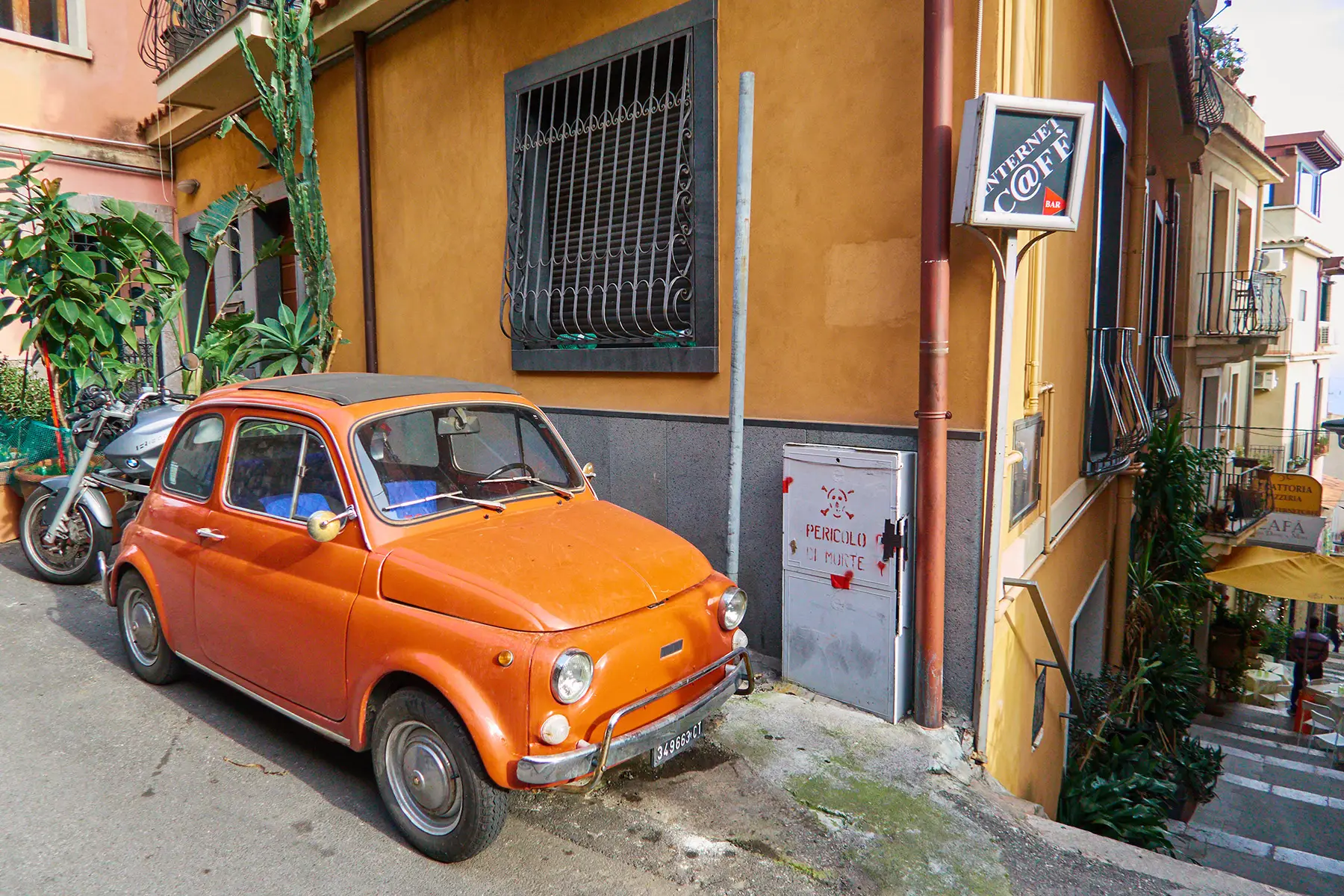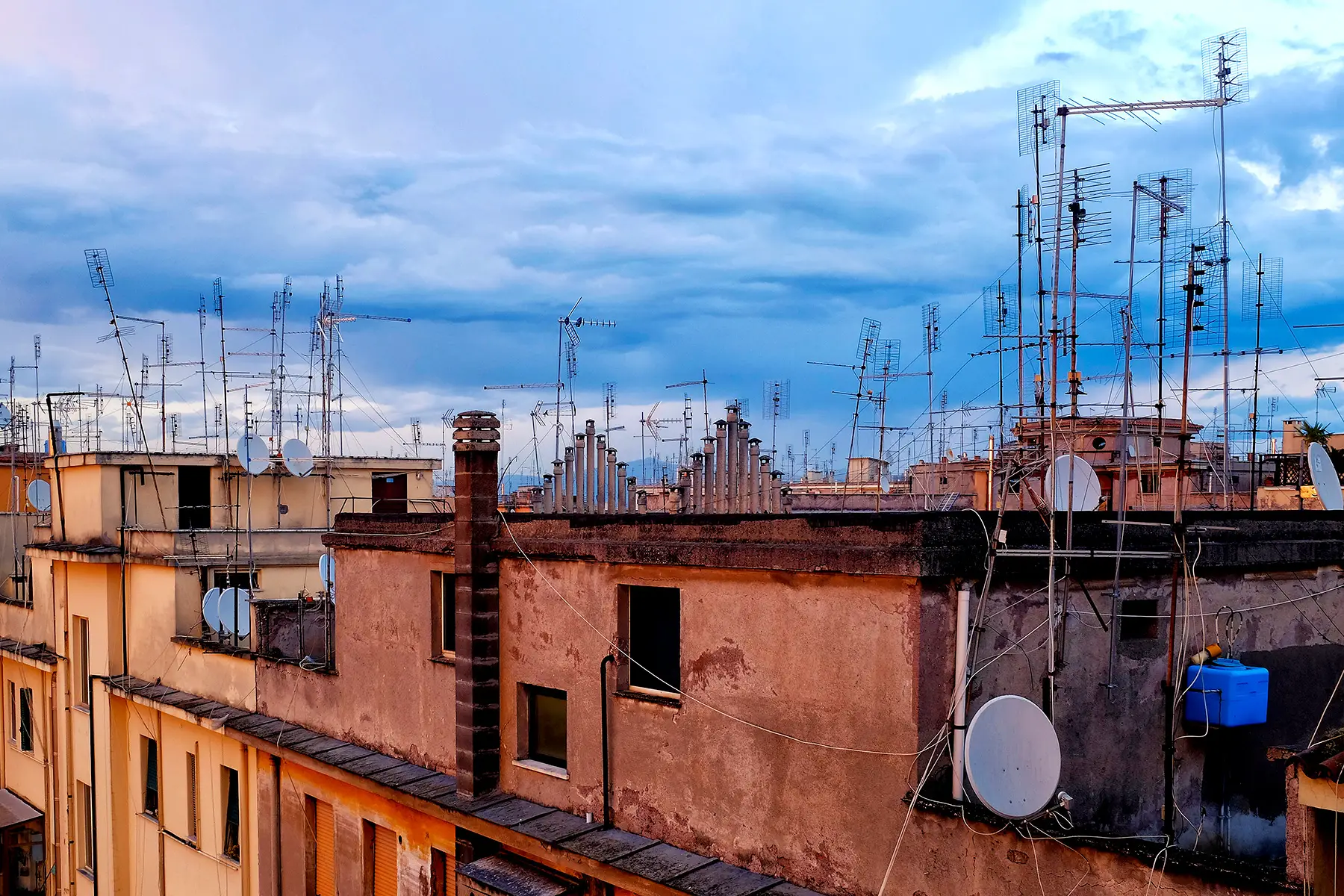Whether you are in Italy for work or travel, having internet and phone access is important for daily life. After you’ve set up your basic utilities in your new home, you will need to figure out how to get your phone, internet, and TV set up. Understanding how to get started with utilities can be intimidating, especially if you haven’t yet learned Italian.
Learn everything you need to know in order to set up your TV, phone, and internet in Italy, specifically:
- Television, phone, and internet in Italy
- Italian television
- Landline phones in Italy
- Mobile phones in Italy
- Italian phone numbers and dialing codes
- Internet in Italy
- Italian telecommunications bills
- Telecommunications repairs in Italy
- Making a complaint about an Italian telecommunications company
- Alternative communication platforms in Italy
- Useful resources
TIMVISION
Don’t miss out on your favorite TV shows while living in Italy – try out TIMVISION. This on-demand video service from Telecom Italia gives you access to top content from Disney+, Netflix, DAZN, and more. Keep up with your favorite sports, movies, and series with TIMVISION.
Television, phone, and internet in Italy
Phone, internet, and television are usually separate from other utilities in Italy. When it comes to providers, Italy has public and private companies. Meanwhile, internet and phone companies are private and their services usually come as a bundle. However, you can choose separate providers if you wish.

Internet in Italy is easily accessible, and in 2021, 75% of Italians were using it. Broadband is widely available throughout the country, even in some smaller towns, as is mobile data. The country scores 75/100 in Freedom House’s 2022 Freedom on the Net ranking, as the online landscape is diverse and allows people to express themselves relatively freely. However, there have also been cases of law enforcement agencies and officials carrying out wiretapping and hacking.
Italian television
Italy has a public television service with multiple channels, as well as cable, satellite, and digital providers. The two main TV organizations are the national broadcasting service, RAI (in Italian), and the commercial broadcasting network, Mediaset. In order to own a TV and gain access to public channels, there is a yearly €90 fee per household that is charged directly into the electricity bill and divided up evenly into smaller payments throughout the year.
You can also add a private TV service such as Sky, the largest private operator in the country that also provides internet. Italians also use streaming companies such as Netflix, Infinity, NOW, and various international streaming services. You could also try TIMVISION for a package deal that includes access to several streaming platforms. If you wish to set up a private TV service, you can find information online on the provider’s website. The public TV service, RAI, will work as soon as you install your television, as the license fee is already applied to your electric bill.
Landline phones in Italy
More than 60% of Italians have landline phones in Italy, although they are less common than cell phones. Some internet companies provide packages with internet and landline included, which might explain why so many Italians still have a home phone.

TIM, Fastweb and WINDTRE are the main landline companies that also provide internet in Italy. Plans cost between €15 to 30 per month, depending on the company and your usage. If you want to set up a landline in Italy, you can start the process online by contacting your provider, but make sure you have your:
- Codice fiscale or tax code
- Proof of address (a bill in your name, rental contract, proof of ownership)
- ID
Mobile phones in Italy
Mobile phones in Italy have increased in popularity over the past few years – in fact, 77% of Italians use a smartphone in their private lives. Italy has great mobile coverage and recently introduced 5G data, making it even easier to get online. Mobile phone plans that include data are also affordable in Italy, starting at just a few euros per month.
Most companies that provide home internet and landlines are also cell phone providers. You can set up your mobile phone plan in person at stores or online with companies such as Iliad, Kena Mobile or WINDTRE. When setting up your phone plan, make sure you bring your tax code and a form of ID.
Italian phone numbers and dialing codes
Fixed line phone numbers in Italy
Landline numbers are a maximum of 11 digits long, starting with a zero, followed by an area code. When dialing a landline number from abroad, you can add the country code, +39, followed by the area code, then the number. You can search for area codes and useful numbers on the Pagine Bianche website. The most common area codes in Italy are:
- Milan: 02
- Rome: 06
- Naples: 081
- Florence: 055
- Bologna: 51
- Turin: 011
Italian mobile numbers
Mobile numbers are ten digits long and start with the number 3, but the first three digits change depending on the company. When calling an Italian number from abroad, remember to use the country code +39 before the mobile phone number.
Calling internationally
When calling Italy from abroad, use the country code +39, followed by the phone number. For landlines, this will include the area code, such as 02 for Milan or 011 for Turin. For mobile numbers, you can dial the country code plus the full phone number (minus the first zero). If you wish to call abroad from Italy, you will need to use the country code of the number you are trying to call.

Italian emergency numbers
Emergency numbers in Italy are three digits long and always begin with the number 1. You do not need an area code to dial these numbers.
If you find yourself in an emergency, call:
- 112 – The emergency number that will contact the necessary authorities
- 113 – Police
- 115 – Fire brigade
- 118 – Emergency medical services
Internet in Italy
According to the Istituto Nazionale di Statistica (National Institute of Statistics – Istat), 76.1% of Italians have an internet connection in their homes. The average broadband speed in Italy is 74 Mbps and Italy has great coverage throughout the country. 5G is also being introduced across Italy, making high-speed internet even more accessible. Internet in Italy can be broadband, wireless, or DSL, depending on your location and provider. The main internet providers in Italy are:
Costs for internet providers depend on your location, desired internet speed, and provider. Prices usually start at around €20 per month – as prices fluctuate, you can always search for the best deal online or directly on internet providers’ websites.
Connecting to the internet in Italy
Once you’ve chosen your internet provider, you will need to take a few steps to set up your connection. Setting up your internet in Italy can take a few days or weeks, depending on which provider you choose and if there was an internet connection in the home previously. Usually, the internet company ships you a router, or you pick it up in the store. They will also send someone to install it, test the internet speed, and answer any questions you may have. To set up internet in Italy, as with any utility, you will need your tax code, ID, and possibly your rental contact.

VPNs
Whether you are traveling to Italy for a short time or making the big move for longer, look into a VPN. A VPN or virtual private network keeps your data safe while browsing online on shared Wi-Fi and allows you to access content that isn’t available in your country of residence. Because a VPN establishes a connection wherever in the world you choose, you can access movies, articles, and websites from other countries without actually being there. VPNs you can use include:
Italian telecommunications bills
Once you’ve set up your TV, phone, and internet in Italy, you will need to make sure to pay your bills on time. Most of these bills are charged monthly to your bank account, or you can pay on your provider’s website. Some companies will also let you pay by phone or email – in some cases, you can pay your paper bill by bringing it to your nearest post office or tabaccheria.
In Italy, the public TV provider, RAI, has a yearly fee attached to your electricity bill. Meanwhile, private TV and streaming services are usually subscription-based, meaning you’ll pay once a month. For internet and phone, you usually have a contract lasting a year or more and pay monthly. You can switch providers before the contract finishes, but you might need to pay an extra month’s fee.
Telecommunications repairs in Italy
If you have an issue with the TV, phone, or internet in Italy, you can contact your service provider directly over the phone or online. If necessary, the company will send someone to your home to take a better look at the issue and resolve it. For problems with devices, you can reach out to the store where you made the purchase, or call a repair technician (in Italian). In the event of an emergency, you can call 112.
Making a complaint about an Italian telecommunications company
If you have complaints about services regarding TV, phone, or internet in Italy, you should first contact your provider’s customer service department to try to resolve the issue. Following that, you can reach out to the Communications Regulatory Authority (Autorità per le Garanzie nelle Comunicazioni – AGCOM). You can submit a formal complaint about the service provider directly through ConciliaWeb, but you will need to use your Italian Electronic ID card or SPID to enter the website. You can also email or call AGCOM. A response can take between 30 and 45 days.
Alternative communication platforms in Italy
Although calls and texts remain popular forms of communication, while living in Italy, you will notice various alternative communication platforms.
VoIP and instant messaging
WhatsApp, Facebook Messenger, and Telegram are popular instant messaging services in Italy. All three platforms are free to download as apps on your smartphone, so you can connect with friends and family in Italy and abroad. It has become more common to use these messaging systems rather than texts or calls throughout the country, not just with loved ones, but also for services and work. If you have access to the internet in Italy on your smartphone, you can use these apps to communicate on a daily basis.
Internet cafés in Italy
Internet cafés are difficult to find nowadays – generally, they have been replaced by coffee shops, co-working spaces, and libraries where people can browse the web, work, or study using free or cheap Wi-Fi. You can find many coffee shops in Italy with free Wi-Fi, perfect for working, studying, or staying up-to-date on current events, especially in big cities.

Many libraries in Italy also offer free Wi-Fi and have public computers available. Co-working spaces have also become more popular – these give remote workers a small office space with Wi-Fi access and sometimes other facilities. You can usually access these spaces with a monthly subscription.
Public phones in Italy
Public phones have become less common in recent years. However, you can still find some public phones around big cities in Italy using the “find a public phone” service by TIM. You can pay to use a public phone in Italy with a phone card or cash.
Useful resources
- Autorità per le Garanzie nelle Comunicazioni (AGCOM) – the Communications Regulatory Authority website which offers more information about telephone, internet, and TV services in Italy
- SOStariffe – allows you to compare different telecommunications deals






